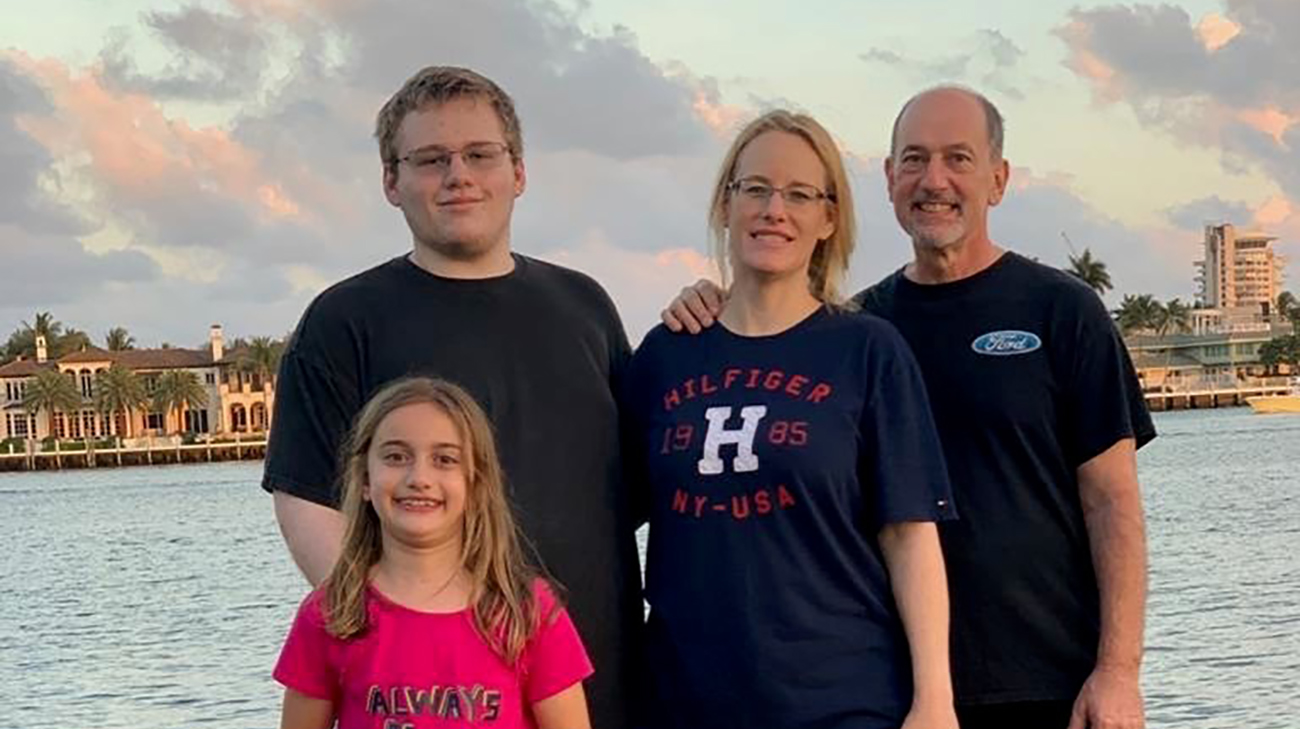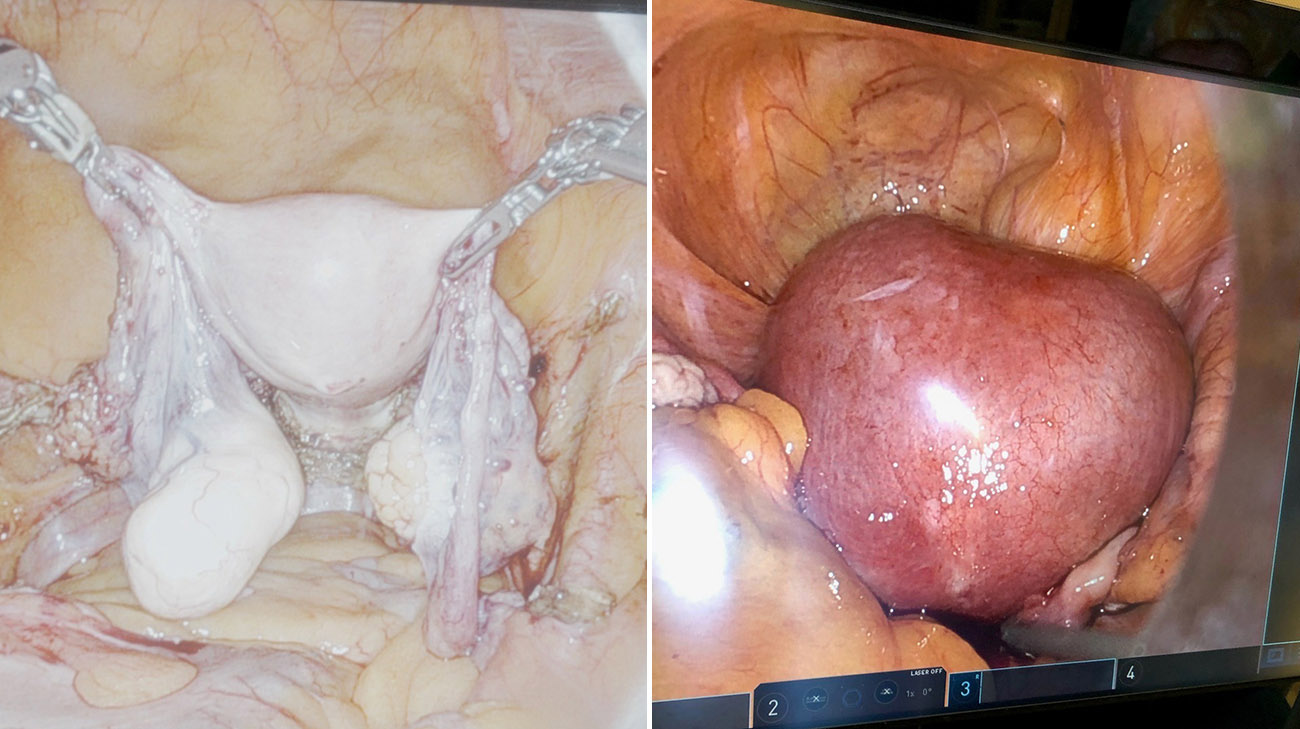Though she is a busy mom, Stephanie thought she was doing the best she could to stay on top of her healthcare. The 50-year-old had gone to her gynecologist regarding progressively heavier menstrual periods, and months of daily bleeding, which resulted in anemia and cramping to the point where something as simple as bending over was too painful.
“It got to the point where life was miserable,” she says. “And I was concerned because of a family history of ovarian cancer, breast cancer and colon cancer.” Stephanie’s mother passed away from ovarian cancer and one of her sisters from breast cancer.
Stephanie, who lives in the Tampa area, saw her gynecologist and underwent a non-surgical treatment for her symptoms. Unfortunately, the treatment failed.

Stephanie with her family.
Desperate for relief, she sought a second opinion from Cleveland Clinic in Florida based on a recommendation from her sister, Elizabeth. Because Stephanie lives in the Tampa area, which is a little over a four-hour drive from Cleveland Clinic Weston Hospital, Joel Cardenas, MD, a specialist in gynecologic oncology, and his team of patient navigators arranged for the first appointment to be done virtually.
“Dr. Cardenas was so personable, even just over a computer screen,” Stephanie says. She was impressed by his thoroughness, the time he spent with her, his questions, and the care that he had for her situation. “The sense of urgency from his staff was nothing like I experienced anywhere else at all. They understood my needs and how important it was for me to get things done quickly because I was suffering.”
Patient navigators Julia and Lori recall Stephanie crying on the phone because her nerves were taking over. They reassured her she was in good hands and they were available if she ever had a question or concern. She would not be alone in her journey.
Her symptoms were important to address quickly, according to Dr. Cardenas, mainly because of her family history and that they could potentially be an expression of gynecologic cancer. The plan of care was done first to take an endometrial biopsy, which turned out to be negative for cancer.
The next step was to help relieve Stephanie from her painful symptoms. While Dr. Cardenas says removing her uterus would have sufficed, he and Stephanie agreed a hysterectomy to treat heavy bleeding and removing her ovaries to eliminate her risk of developing ovarian cancer was the best option. Her patient navigators immediately scheduled Stephanie to come in the next week and get all her testing completed in one day in preparation for surgery.
A few weeks later, Stephanie underwent a full hysterectomy and additional biopsies, which Dr. Cardenas performed via a robotic approach. “In minimally invasive robotic assisted surgery the surgeon uses tiny instruments that are highly precise,” Dr. Cardenas says. “The benefits are less pain, faster recovery, less bleeding and lower risk of complications.”
The procedure revealed that Stephanie’s uterus was four times the normal size and showed severe adenomyosis (a growing of the lining of the uterus into the walls of the uterus) and enlarged benign leiomyomas (fibroids). There were no signs of cancer.

Normal uterus (left) compared to Stephanie's enlarged uterus (right).
While in the hospital awaiting surgery, Stephanie said she felt nervous but was comforted by Dr. Cardenas, who simply put his hand on her shoulder and told her they would take good care of her.
“I felt a calmness come over me and I just knew I would be okay,” she says.
Stephanie also met with Genetic Counselor, Sarah Rhode for genetic testing. Stephanie tested for the BRCA gene over ten years ago because of her family history but Sarah informed her she needed updated testing and a more thorough look. Her results now live in a database (for her lifetime) where if any genetic mutations are developed in the future, Stephanie is notified not only for herself but for her children too.
“It doesn’t matter how far you need to travel. As long as you’re receiving the care you need.”
Stephanie said traveling so far from home to Cleveland Clinic Weston Hospital wasn’t a problem because “it doesn’t matter how far you need to travel. As long as you’re receiving the care you need. She also says, “I didn’t think I was waiting very long to get the help I needed because I thought I was getting good care. Until I went to Cleveland Clinic. I knew I was getting the best care I needed. That was second to none.” She was especially impressed and appreciative of the care she received from Dr. Cardenas.
“He feels like family to me,” she says. “He has such a warm and generous personality. It’s nothing like I’ve ever experienced with a doctor before, which is phenomenal and something I will never forget.”
She offers advice to other women who may be putting off their care: “Make the time because it is so important. You just don’t know if something that you’re feeling is something wrong. Listen to your body and be sure to get your general checkups.”


